 W
WAnimal Liberation: A New Ethics for Our Treatment of Animals is a 1975 book by Australian philosopher Peter Singer. It is widely considered within the animal liberation movement to be the founding philosophical statement of its ideas. Singer himself rejected the use of the theoretical framework of rights when it comes to human and nonhuman animals. Following Jeremy Bentham, Singer argued that the interests of animals should be considered because of their ability to experience suffering and that the idea of rights was not necessary in order to consider them. He popularized the term "speciesism" in the book, which had been coined by Richard D. Ryder to describe the exploitative treatment of animals.
 W
WAnimals' Rights: Considered in Relation to Social Progress is an 1892 book by the English social reformer Henry Stephens Salt. It is widely considered to be the first explicit treatment of the concept of animal rights.
 W
WBehind the Scenes in Slaughter-Houses is a 1892 pamphlet on animal slaughter by H. F. Lester.
 W
WThe Cahiers antispécistes, originally called Cahiers antispécistes lyonnais, was a French-language journal published from 1991 to 2019, with the aim of disseminating antispeciesist ideas and stimulating debate on animal ethics, particularly on the distinction between animal liberation and ecology. It was published quarterly during its first years of existence, then annually. Issue 43, the last issue, was published in August 2019.
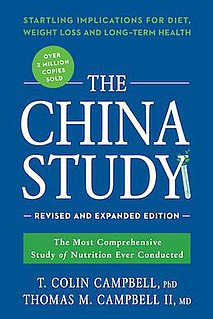 W
WThe China study: The Most Comprehensive Study of Nutrition Ever Conducted and the Startling Implications for Diet, Weight Loss and Long-term Health is a book by T. Colin Campbell and his son, Thomas M. Campbell II. The book argues for health benefits of a whole food plant-based diet. It was first published in the United States in January 2005 and had sold over one million copies as of October 2013, making it one of America's best-selling books about nutrition.
 W
WDiet for a Small Planet is a 1971 bestselling book by Frances Moore Lappé, the first major book to note the environmental impact of meat production as wasteful and a contributor to global food scarcity. She argued for environmental vegetarianism—practicing a vegetarian lifestyle out of concerns over animal-based industries and the production of animal-based products.
 W
WEating Animals is the third book by the American novelist Jonathan Safran Foer, published in 2009. A New York Times best-seller, Eating Animals provides a dense discussion of what it means to eat animals in an industrialized world. It was written in close collaboration with Farm Forward, a US nonprofit organization promoting veganism and sustainable agriculture.
 W
WThe Farm Vegetarian Cookbook is a vegan cookbook by Louise Hagler, first published in 1975. It was influential in introducing Americans to tofu, included recipes for making and using tempeh and other soy foods, and became a staple in vegetarian kitchens.
 W
W"The First Step" is an article by Leo Tolstoy primarily advocating for vegetarianism, but at the same time also briefly mentioning themes relating to anarchism and pacifism. It was Tolstoy's preface to a book by Howard Williams, which Tolstoy translated into Russian.
 W
WThis is a list of fictional characters that either self-identify as vegetarian or have been identified by outside parties to be vegetarian. Listed characters are either protagonists and recurring characters. Some scholars have argued that mass media serves as a "source of information for individuals" interested in vegetarianism or veganism, while there are "increasing social sanctions against eating meat." Even so, there are lingering stereotypes of vegans and vegetarians in the same media, with journalist Farhad Manjoo writing in August 2019 that it is "still widely acceptable to make fun of vegans."
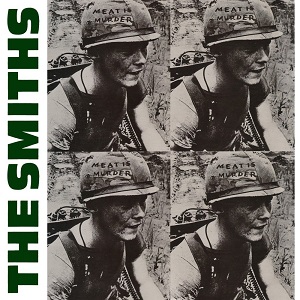 W
WMeat Is Murder is the second studio album by English rock band the Smiths, released on 11 February 1985 by Rough Trade Records. It became the band's only studio album to reach number one on the UK Albums Chart, and stayed on the chart for thirteen weeks. The album was an international success: it spent 11 weeks in the European Top 100 Albums chart, peaking at number 29. It also reached number 110 on the US Billboard 200, in the United States.
 W
W"New Age Girl" is a song by alternative rock trio Deadeye Dick, from their debut album A Different Story and the soundtrack to the 1994 film Dumb and Dumber.
 W
WPeople for the Ethical Treatment of Animals (PETA), an animal rights organization based in the United States, has released a number of browser games on its website that have parodied existing video games. Various PETA parodies have been made based on games such as New Super Mario Bros., Cooking Mama 2: World Kitchen, New Super Mario Bros. Wii, Super Meat Boy, Super Mario 3D Land, Pokémon Black 2 and White 2, and Pokémon X and Y. PETA creates these games to spread attention about real-life animal rights and animal welfare concerns and to advocate for vegetarian and vegan diets.
 W
WTen Talents is a vegetarian and vegan cookbook originally published in 1968 by Rosalie Hurd and Frank J. Hurd. At the time, it was one of the few resources for vegetarian and vegan cooks. The cookbook promotes Christian vegetarianism and a Bible-based diet, in keeping with teachings of the Seventh-day Adventist Church. By 1991, the 750-recipe cookbook was entering its 44th printing and had sold more than 250,000 copies. An expanded edition with more than 1,000 recipes was issued in 2012.
 W
WThe Universal Kinship is a 1906 book by American zoologist, philosopher, educator and socialist J. Howard Moore. In the book, Moore advocated for a secular sentiocentric philosophy, called the "Universal Kinship", which mandated the ethical consideration and treatment of all sentient beings based on Darwinian principles of shared evolutionary kinship, and a universal application of the Golden Rule; a direct challenge to anthropocentric hierarchies and ethics. The book was endorsed by Henry S. Salt, Mark Twain and Jack London, Eugene V. Debs and Mona Caird.
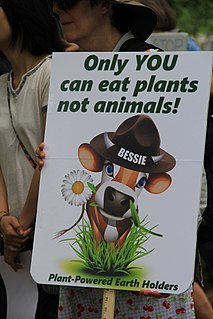 W
WVegetarians are those who abstain from the consumption of meat, and may also include abstention from by-products of animal slaughter. Some scholars have argued that mass media serves as a "source of information for individuals" interested in vegetarianism or veganism, while there are "increasing social sanctions against eating meat" and a continuing trend of less meta consumption in the United States due to a focus on physical health and environmental awareness. Over time, societal attitudes of vegetarianism have changed, as have perceptions of vegetarianism in popular culture, leading to more "vegetarian sentiment." Even so, there are still existing "meat-based" food metaphors which infuse daily speech and those who are vegetarian and vegan are met with "acceptance, tolerance, or hostility" after they divulge they are vegetarian or vegan. Additionally, some argue that veganism has been dismissed in news media or that clickbait culture often portrays feminists and vegans as "irrational extremists." This is because in Western societies, "meat-based diets are the norm" with those who avoid meat still representing "a small minority," with more women than men as vegan and vegetarian, with women being "under-represented in the mass media," the latter influencing more to be vegetarians.
 W
WVegetarian Times was an American magazine published nine times a year by Cruz Bay Publishing, Inc., a subsidiary of Active Interest Media. The magazine's audience consisted of vegetarians, vegans, and "semi-vegetarians" who are focused on a healthy lifestyle. Vegetarian Times promoted an eco-friendly lifestyle with recipes, wellness information, cooking techniques, and information on "green" products. Half of the readership did not follow a strict vegetarian diet.
 W
WA Vindication of Natural Diet is an 1813 book by Percy Bysshe Shelley on vegetarianism and animal rights. It was first written as part of the notes to Queen Mab, which was privately printed in 1813. Later in the same year the essay was separately published as a pamphlet.
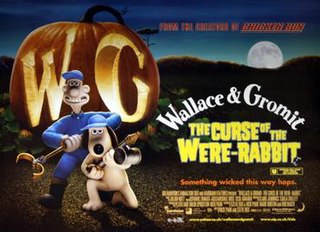 W
WWallace & Gromit: The Curse of the Were-Rabbit is a 2005 stop-motion clay-animated supernatural comedy film produced by DreamWorks Animation and Aardman Animations. United International Pictures distributed the film in the United Kingdom, and it was the last DreamWorks Animation film to be distributed by DreamWorks Pictures in the United States. It was directed by Nick Park and Steve Box as the second feature-length film by Aardman, after Chicken Run (2000). The film premiered in Sydney, Australia on 4 September 2005, before being released in cinemas in the United States on 7 October 2005 and in the United Kingdom a week later on 14 October 2005.
 W
WWhy I Am a Vegetarian is an 1895 pamphlet based on an address delivered by J. Howard Moore before the Chicago Vegetarian Society. It was reprinted several times by the society and other publishers.
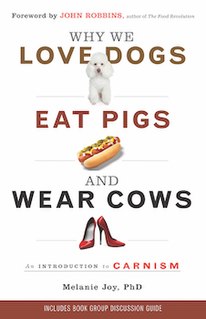 W
WWhy We Love Dogs, Eat Pigs, and Wear Cows: An Introduction to Carnism is a 2009 book by American social psychologist Melanie Joy about the belief system and psychology of meat eating, or "carnism". Joy coined the term carnism in 2001 and developed it in her doctoral dissertation in 2003. Carnism is a subset of speciesism, and contrasts with ethical veganism, the moral commitment to abstain from consuming or using meat and other animal products. In 2020, an anniversary edition of the book was published by publisher Red Wheel.